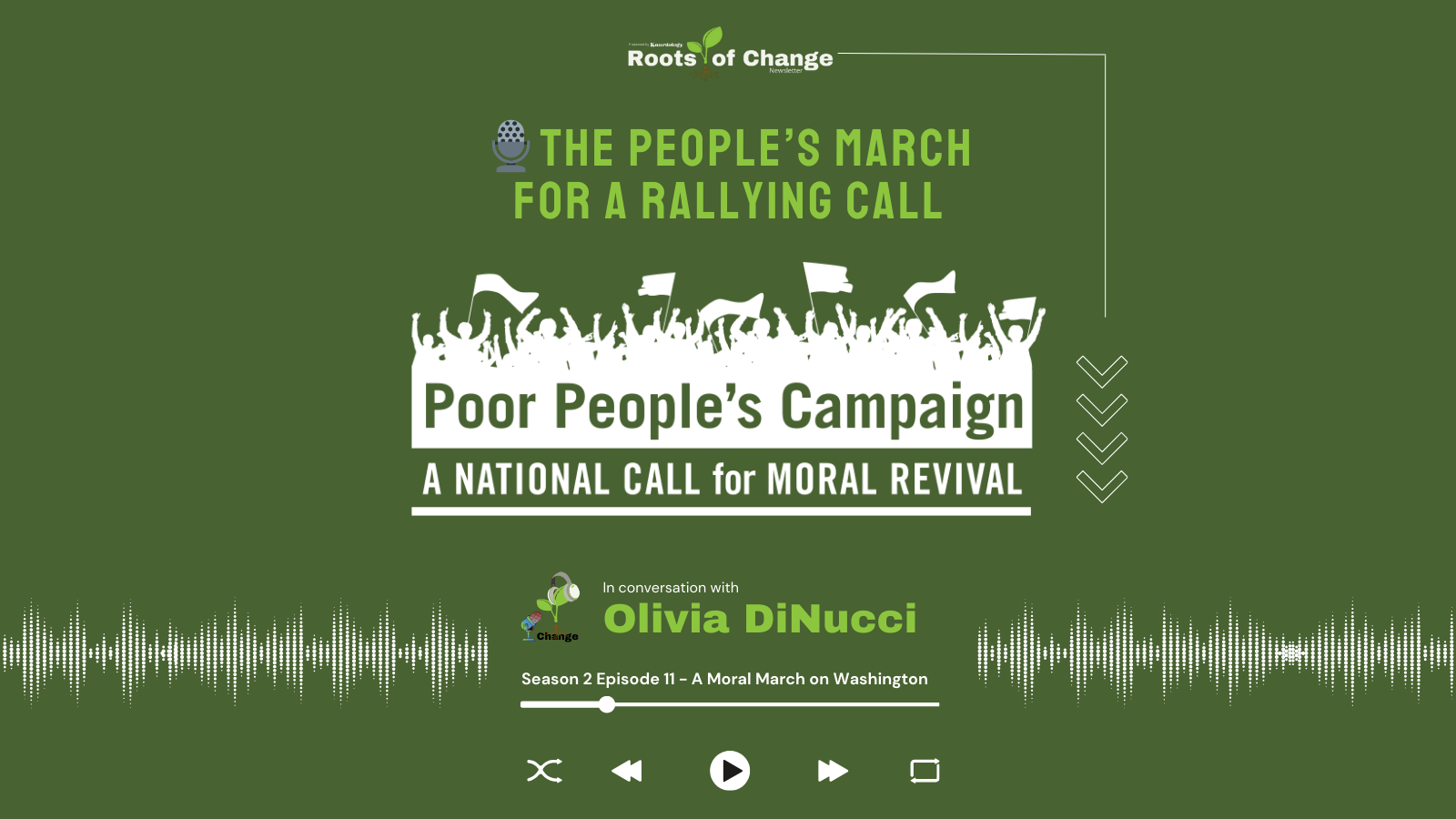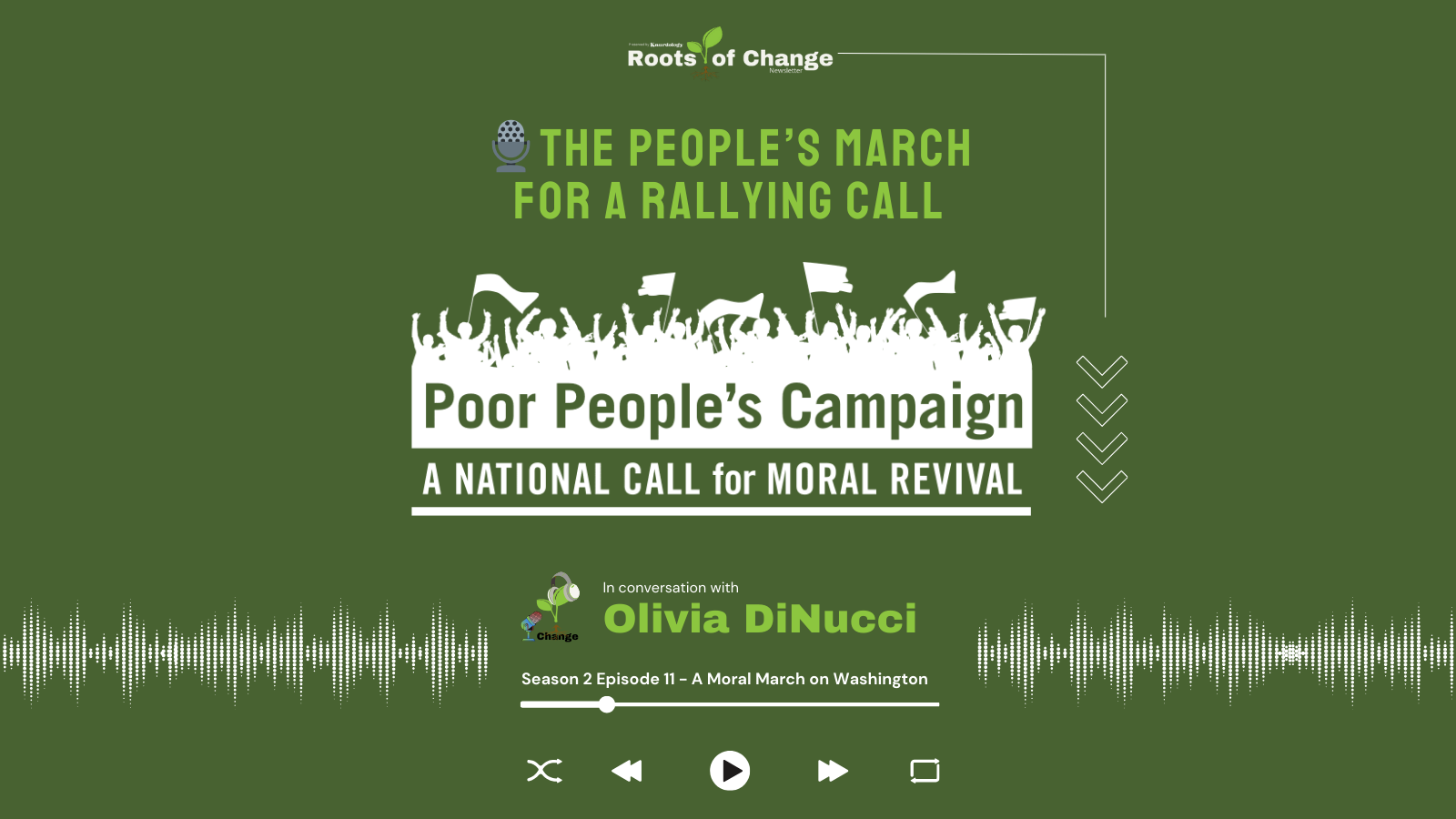
🎙 The People's March for a Rallying Call
In conversation with Olivia DiNucci
Hi Y’all! 👋🏽
I was lucky enough to catch organizer, Olivia DiNucci (she/her), just before the People's March in Washington D.C. this past weekend. We spoke about the escalating importance of rallying the nation in the struggle against racism, poverty, ecological devastation, and militarism and how activists can find hope in these moments. It was a quick 15-minute conversation packed with good insights!

The Poor People’s Campaign organized A National Call for Moral Revival in the nation’s capital on June 29th to uplift and center the needs of the over 135 million poor and low-wage people and workers across the country. The march included demands from elected officials to enact their 17-Point Agenda, which includes living wages, voting rights, and other essential policies that lift from the bottom. Olivia and I spoke about the importance of organizing and community during the incredibly uncertain realities we've already faced in 2024. I hope you enjoy!
Listen on Spotify
Listen on Apple Podcasts
Watch on YouTube
About Poor People's Campaign
In 1968, Rev. Dr. Martin Luther King Jr. and many others called for a “revolution of values” in America. They sought to build a broad, fusion movement that could unite poor and impacted communities across the country. Their name was a direct cry from the underside of history: The Poor People’s Campaign.
Today, the Poor People’s Campaign: A National Call for Moral Revival has picked up this unfinished work. From Alaska to Arkansas, the Bronx to the border, people are coming together to confront the interlocking evils of systemic racism, poverty, ecological devastation, militarism and the war economy, and the distorted moral narrative of religious nationalism. We understand that as a nation we are at a critical juncture — that we need a movement that will shift the moral narrative, impact policies and elections at every level of government, and build lasting power for poor and impacted people.
- Learn more about Poor People's Campaign
- Find opportunities to take action in your area
- Follow Poor People's Campaign on Instagram
About Sam & Roots of Change
Sam Chavez is a storyteller, strategist, and curious human. She founded Roots of Change, a storytelling agency for activists, non-profits, and political organizations in 2020. Sam is a queer, white, LatinX activist who’s passionate about a livable planet & equitable societies.
- Subscribe to the roots of change newsletter
- We are 100% reader supported, consider donating to support our work.
- Explore the roots of change agency
📖 Read Today’s Interview 👩🏻🏫
Log in or subscribe for free to read the Full Transcript
Sam Chavez at The Roots of Change Agency (she/her) — Hey y'all, this is Sam Chavez with the Roots of Change Podcast, and I'm really excited because today we have Olivia DiNucci, who is an anti-militarism and climate organizer. We are speaking today on Thursday, June 27th, which is just a few days before the People's March in DC. This march is billed as a generationally transformative gathering of poor people, low wage workers, faith leaders, and advocates. Olivia, welcome! Thank you so much for joining me.
Olivia DiNucci (she/her) — Thanks for having me.
Sam Chavez at The Roots of Change Agency (she/her) — Can you tell us a little bit more about the march, and why this march is being organized?
Olivia DiNucci — Yes, the Poor People's Campaign, which is the legacy of Martin Luther King Jr. to address his three evils: racism, poverty, and militarism, and more recently adding ecological devastation to it. Two years ago, there was a mass march where working-class, poor, and low-income folks from across the country gathered in DC. Decades ago, they had an encampment on the Mall with around 3,000 people, sending a sense of urgency that poverty, racism, and militarism are destroying the fabric of society. This year, those evils are timeless, and this march is another attempt to bring people together under the legacy of Martin Luther King Jr. to address these ongoing issues.
People from all over the country, from North Carolina, Chicago, Louisiana, California. From all over the country are gonna descend on DC for a Poor People's Assembly. There are different list of demands, including protecting voter rights, divesting from the war machine, addressing the healthcare and housing crises, and really just like this moral reclamation to go back to the the very values that a lot of our politicians say they have, but demanding that they act on them.
Sam Chavez at The Roots of Change Agency (she/her) — Yeah absolutely. Thank you for that. I'm so bummed that I'm going to be missing it. It's pride weekend in San Francisco, so I'll be organizing actions there. But it goes without saying, but I'm going to ask the question anyway. We are in June of 2024. It's a very interesting year. A lot has happened, especially around the issues you just spoke to. Why organize this march now? Why bring people to DC?
Olivia DiNucci — We're seeing so many compounding crises, whether it's people not being able to put food on their table, the daily needs, money for rent and healthcare costs. We're the richest country in the world with a trillion-dollar Pentagon budget and billions more out the door, going to places like Israel and sending Kenyan troops to Haiti.
These are all things that the U.S. is part of abroad, and so many billions of billions of dollars are going to that when you know we're fighting for a minimum wage is $15 an hour, which is one of the the demands
The 17 demands of the Poor People's Campaign include things like fully funded public education, just immigration laws, fully protecting women's rights and addressing gun violence, healthcare for all, and an end to extremist political agendas. These are things that at face value are simple. Basic needs and basic things that we've been fighting for for so long, and the fact that our politicians continue to not only not address them, but like actively fund things that go against them and actively create policies that are detrimental and that are violent. And so it is a really important time right now as endless wars deepen as the climate crisis deepens. That poverty is violence, and that we it's about time that we take these issues. seriously. Across the board.
Sam Chavez at The Roots of Change Agency (she/her) — I really appreciate you saying that and kind of weaving all of those things together, because one of the biggest questions I get as an organizer is where do you start? What do you do first? And I think the way you explained it, they're all interconnected. You hear a lot of questions around why people stand up against the war on Gaza and not fight for people at home. But what you just shared shows we are fighting for people at home and abroad when we fight for all these issues.
Olivia DiNucci — Absolutely. Such a big reason why Palestinian liberation is so important across movements because of the U.S. backing Israel with so much support, billions of dollars, and U.S.-made weapons. Even if you don't talk about it through a human rights lens, which we of course should. Even if it's strictly through economic and monetary reasons, the amount of money that we can just overnight, and within seconds send to continue to carry out this genocide and continue to kill families and mothers and fathers and children that that money can be directly given to the people in this country, whether it's universal based income, whether it's healthcare, whether it's clean air and water. And so this is not just like, oh, we should care about the humanity of all people, which it should be that, too. But also, if we're wondering where the money comes from to pay for social services in this country, it's going out the door to totally obliterate, like our, our, our our our neighbors, and our our friends in humanity across the world.
Sam Chavez at The Roots of Change Agency (she/her) — Yeah, absolutely. Thank you for that. I’m definitely agreeing over here. I want to shift to the organizing efforts of the Poor People's Campaign and all the organizations involved in the People's March. How are you balancing both offline efforts of being in D.C. and online actions during and after the march?
Olivia DiNucci — I would defer to those organizing with the Poor People's Campaign day in and day out. Many of them are leaders in in the States who are directly impacted by all of the evils that we were talking about, and they are in person, whether they're organizing in their churches, at their community centers, at their mosques, at their schools, at their town hall meetings, at their neighborhood gatherings. And then, of course, the online aspect allows for people to feel like they're part of something bigger, so that they can attend, you know, calls with people doing webinars from all over the country.
Here in DC, we are activating to welcome people into a place that you know we often refer to as like “the belly of the beast,” and that for someone who lives here I'm out for adjusting. I'm out doing things day in and day out, but it's for some people who come to the poor people's campaign march. It's the 1st time that they're here. And they feel really empowered to be to be bringing their issues to the nation's capital. The capital is were so many of these decisions are made, and yet the people are who this they need to be listening to. So we've been doing an outreach here because a lot of people in DC have those same issues. They're under the same impression that a lot of the people from specifically the Gulf south, and in DC or these areas that you know, these pipelines are in and rural areas, or that environmental racism is affecting people. And like in parts of Louisiana, North Carolina, other areas.
So we're doing, we pacing to get the word out. Here we are having you know, sharing out on social media different things. But it's definitely like a local to national, like way that people are organizing. That's really it's really great.
Sam Chavez at The Roots of Change Agency (she/her) — Yeah, I really love that. It's there is that community angle like I can definitely understand, like walking into DC, not knowing for the 1st time and being fired up. But also, you know, needing that support. So that's really amazing that you're you're doing that as well. I'm curious, too, just like from a digital perspective. Knowing that we're in a state of repression, there is a lot of shadow banning and and other tactics that are happening to suppress more progressive messaging.
How are you communicating? How are you combating that for this march, and just in general, for all of your efforts.
Olivia DiNucci — You're seeing social media shadow ban accounts. In Congress, they're trying to ban TikTok. They know that we are powerful, that people who are standing up for progressive things are, we have power, and they're trying to restrict that.
I do think like like organizing is relational, and so as much as we can do in-person, the better. As much as we can organize locally the better strengthen through political education, connecting the dots connecting the dots around how all of our liberation is connected. You know, bringing in mutual aid that includes our unhoused neighbors. That also includes the voices of our incarcerated formerly incarcerated neighbors and friends. And, you know, making things accessible online, making these a ways to be able to plug in like, not everyone has time to like be out in the streets because they're working several jobs. So.
How do those of us with privilege utilize that? Those of us who aren't under surveillance because of our last name or the color of our skin can be more public on social media. Then also you know, always emphasizing and uplifting those, those those voices and those those communities that want to be more public, but just don’t know how.
Sam Chavez at The Roots of Change Agency (she/her) — I'm very much about like activism is kind of a choose your own adventure situation. And a lot of times we people who are more privileged. I am Latine, but I have very white skin, and I'm perceived as white. And so I have privilege in terms of the ways that I can do my activism. And we should all be looking at how we can use our own privileges to move those progressive issues forward in this moment.
I just wanna say, as we close out, I'm so appreciative of chatting with you right before the march. This is gonna come out right afterwards. So hopefully, we'll have some really exciting video and other social media posts to correspond with this, but to to close out. I ask a question for everyone, and that is, how do you stay sane in this wild world?
Olivia DiNucci — Yeah, it's a good question. We are so rooted in love. The rage is rooted in love, the struggle is rooted in love, the deepening of connections like.
I want people to know that there's so much community in this. And there's ways for everyone to get involved. The meals that we've had together at these actions of these encampments that have been homemade or people are donating, because that's a way for them to plug in. The artists and creatives, making like, beautifying our messages and and and and incorporating cultural elements of of music and and of song or different ways to plug in that way that.
The friendships that I have the deepest ones are ones from the movement. And so really reminding ourselves what we're fighting for as we fight over for, against and and and being surrounded by such people, rooted in love for me, keeps me going.
Sam Chavez at The Roots of Change Agency (she/her) — Yeah, absolutely. I I can definitely get on board with that. And there's so much strength when you're together. And you know that you're moving forward with the same purpose and a purpose that is rooted in love. So I really love that message.
Well, thank you so much, Olivia, and good luck out there, and we're really excited to watch from the sidelines, unfortunately. But can't wait to get back out there in DC. In the future.
Olivia DiNucci — Yeah, thanks so much and enjoy pride in San Francisco. And yeah, and and looking forward to the march and following up because we're building for what's next.
Sam Chavez at The Roots of Change Agency (she/her) — Yeah. And and quickly, do you wanna just say where people can find the information online.
Olivia DiNucci — Go to poorpeoplescampaign.org. It has all the information about this march and what you can do locally and afterward as well.
Sam Chavez at The Roots of Change Agency (she/her) — Awesome. Thank you so much, Olivia.
the roots of change media Newsletter
Join the newsletter to receive the latest updates in your inbox.



